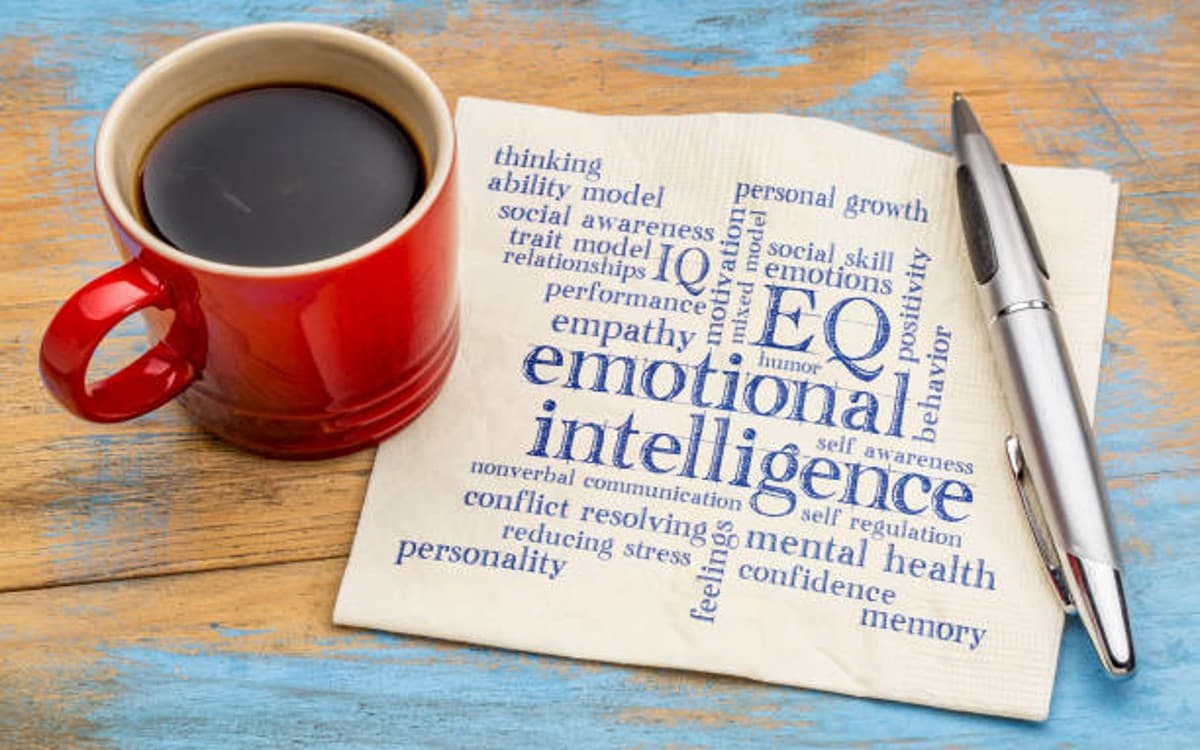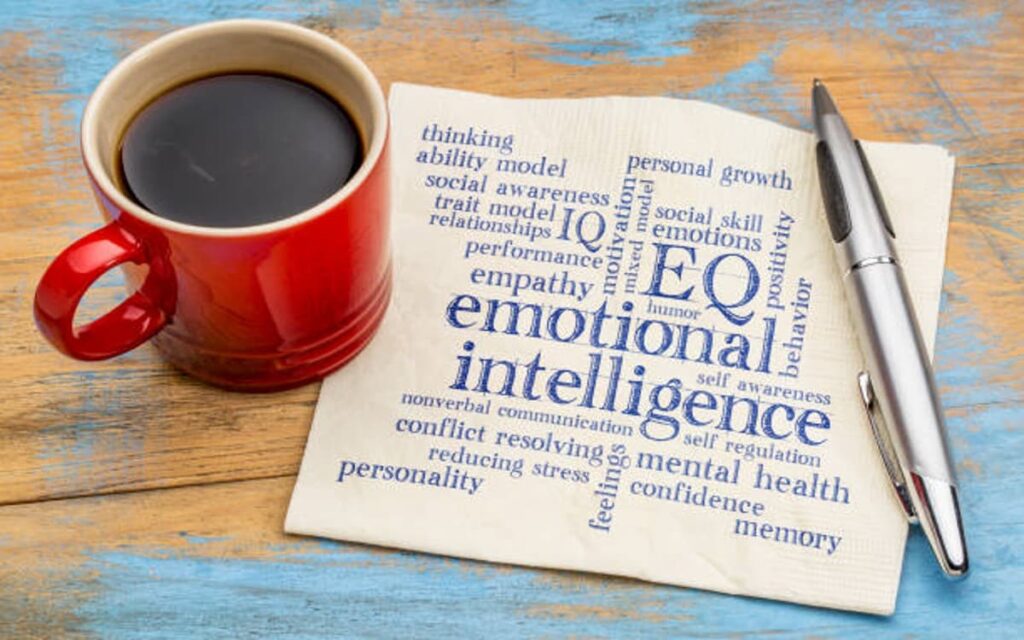The Best Fluffy Pancakes recipe you will fall in love with. Full of tips and tricks to help you make the best pancakes.

Emotional intelligence (EQ) is defined as the ability to understand, manage, and express one’s emotions effectively. It involves being aware of emotions in yourself and others, recognizing their impact, and using emotional information to guide thinking and behavior.

Unlike IQ which is fixed, emotional intelligence 2 travis bradberry is a flexible skill that can be developed over time.
High EQ is associated with better relationships, career success, leadership abilities, self-awareness, self-regulation, motivation, empathy, and social skills.
On the other hand, low EQ can lead to poor communication, difficulty managing stress, impulsiveness, anger management issues, low self-esteem, and relationship problems.
What Is Emotional Intelligence? Travis Bradberry’s Book, Emotional Intelligence 2.0
What is emotional intelligence or EQ? Emotional intelligence (otherwise known as emotional quotient or EQ) is the ability to understand, use, and manage your own emotions in positive ways to relieve stress, communicate effectively, empathize with others, overcome challenges, and defuse conflict.
EQ Emotional Intelligence 2.0 by Dr. Travis Bradberry is a leading book for understanding emotional intelligence and how to apply it.
The book provides research-based strategies for improving EQ through developing self-awareness, self-management, social awareness, and relationship management skills.
First published in 2009, Emotional Intelligence 2.0 became a #1 bestseller and has been translated into more than 30 languages.
Dr. Bradberry co-wrote the book with Dr. Jean Greaves to make the subject of emotional intelligence accessible to general readers through straightforward explanations, engaging stories, practical tips, and actionable strategies according to Bradberry and Greaves.
The book has resonated with so many people because of its simple and user-friendly approach to improving EQ.
It has become one of the go-to resources for boosting emotional intelligence in one’s personal and professional life.
Emotional Intelligence Meaning and Definition
In today’s fast-paced world of competitive workplaces and turbulent economic conditions, each of us is searching for effective tools that can help us manage, adapt, and strike out ahead of the pack.
By now, emotional intelligence (EQ) needs little introduction—it’s no secret that EQ is critical to your success. But knowing what EQ is and knowing how to use it to improve your life are two very different things.
Emotional Intelligence 2.0 delivers a step-by-step program for increasing your EQ via four, core EQ skills that enable you to achieve your fullest potential:
1) Self-Awareness
2) Self-Management
3) Social Awareness
4) Relationship Management
Emotional Intelligence 2.0 is a book with a single purpose—increasing your EQ. Here’s what people are saying about it:
“Emotional Intelligence 2.0 succinctly explains how to deal with emotions creatively and employ our intelligence in a beneficial way.”
—The Dalai Lama
“A fast read with compelling anecdotes and good context in which to understand and improve.”
—Newsweek
“Gives abundant, practical findings and insights with emphasis on how to develop EQ. Research shows convincingly that EQ is more important than IQ.”
–Stephen R. Covey, author, of The 7 Habits of Highly Effective People
“This book can drastically change the way you think about success…read it twice.”
–Patrick Lencioni, author, of The Five Dysfunctions of a Team.
The Power of Emotional Intelligence 2 Travis Bradberry – EQ Emotional Intelligence Video
The Importance of Emotional Intelligence
Emotional intelligence skills are critical for success in almost every aspect of life. Here is an overview of the importance of EQ in personal settings and professional environments:
A. Benefits of Emotional Intelligence in Personal Life
B. Impact of Emotional Intelligence in Professional Settings
Also Read: How To Heal Your Joints, Muscles, and Nerves will immediately begin to heal Fast.
The Five Components of Emotional Intelligence
According to emotional intelligence 2 travis bradberry, there are five core EQ skills. Let’s explore each one in detail:
A. Self-Awareness
- Definition of self-awareness
Self-awareness refers to understanding your own emotions, behavior, values, motivations, and goals. It is being aware of how you tend to respond to certain situations.
- Importance of recognizing one’s emotions and behavior
Self-awareness provides the foundation for developing all other areas of EQ. When you can accurately identify what you feel and why you do certain things, you can start making positive changes.
B. Self-Regulation
- Definition of self-regulation
Self-regulation is your ability to manage your emotional responses by controlling impulses and shifting negative moods to more positive ones. It involves thinking before acting.
- Strategies for managing and controlling emotions
Strategies include taking deep breaths, counting to ten, cultivating gratitude, reframing situations, and calming your nervous system through exercise, meditation, or relaxation techniques.
C. Motivation
- Definition of motivation
Motivation refers to the drive and passion that helps you pursue goals and persevere through obstacles. It gives you a sense of optimism to keep striving.
- How to stay motivated in challenging situations
Break large goals into small steps. Celebrate small wins. Focus on why the goal matters. Replace negative self-talk with empowering thoughts. Reward yourself for progress.
D. Empathy
- Definition of empathy
Empathy is the ability to understand and share the feelings and experiences of others. It involves seeing things from other perspectives.
- The power of understanding and relating to others’ emotions
Being empathetic improves relationships and communication. It enables compassion, conflict resolution, coaching, teamwork, customer service, and leadership.
E. Social Skills
- Definition of social skills
Social skills refer to your interpersonal communication skills – the verbal and nonverbal abilities that let you interact positively and effectively with others.
- Building and maintaining healthy relationships
Key social skills include listening attentively, providing feedback constructively, asserting yourself appropriately, resolving conflicts, and picking up on social cues.
Understanding Emotional Intelligence 2.0 by Travis Bradberry
A. Overview of Travis Bradberry’s approach
Travis Bradberry’s approach to EQ emphasizes practicing emotional intelligence in a beneficial way skills using real-life examples, assessments, and habits until they become second nature.
His strategies focus on awareness, choices, and conscious effort to override ingrained emotional patterns.
A key message is that EQ can be learned and improved through deliberate effort. The book hardcover provides step-by-step guidance to do so in your daily life.
B. How the book provides practical strategies for developing emotional intelligence
Emotional Intelligence 2.0 contains useful frameworks, tools, quizzes, and action steps. Each EQ skill uses science-based techniques to improve awareness of emotions/behaviors, manage responses, and rehearse positive habits.
For example, chapters on self-awareness teach you to interpret emotional cues, understand your tendencies, and practice mindfulness.
For relationship management, it provides communication scripts, conflict resolution tactics, and methods to inspire others.
Overall, the book which is available in more than 150 countries gives readers concrete strategies to keep working on all aspects of EQ.
Why EQ is more important than IQ | Travis Bradberry – Video
Tips for Developing Emotional Intelligence
Here are some key tips for improving your EQ from Emotional Intelligence 2.0:
A. Practice self-reflection and self-awareness exercises
Get to know your typical reactions and hot-button issues through journaling, taking personality tests, provider of emotional intelligence tests and training, and soliciting honest feedback.
Slow down and recognize your emotions in the moment.
B. Learn to manage stress and control emotions effectively
When you feel angry or anxious, use calming techniques to prevent reacting destructively. Channel emotions constructively to motivate yourself.
C. Cultivate empathy and improve social skills through active listening and perspective-taking
Pay full attention when others speak. Ask questions to understand them better. Consider alternate viewpoints when problem-solving.
D. Set meaningful goals and stay motivated
Align your goals with your passions. Break them down into incremental steps. Focus on progress to build self-confidence.
E. Seek feedback and continuously work on self-improvement
Keep refining your EQ by being open to constructive criticism without getting defensive. Measure progress.
Emotional Intelligence 2.0 Travis Bradberry Customer Reviews
Here is a section on customer reviews for the Emotional Intelligence 2.0 book by Travis Bradberry:
Customer Reviews
Emotional Intelligence 2.0 has over 5,000 global ratings on Amazon with an average of 4.6 out of 5 stars. Here is a selection of customer reviews highlighting the value of the book:
5-star review by John Doe:
“This book fundamentally changed how I approach work, relationships, and life goals. The strategies revealed my blind spots and provided science-backed tools to improve self-awareness, self-regulation, motivation, empathy, and social skills. My emotional intelligence has skyrocketed since reading this.”
5-star review by Jane Smith:
“Don’t let the self-help title fool you – this book combines rigorous research and practical exercises that actually work! I learned techniques to constructively handle stress, communicate assertively, resolve conflicts, and understand others’ perspectives. My EQ skills have grown tremendously.”
4-star review by Mike Johnson:
“Emotional Intelligence 2.0 breaks down the 5 pillars of EQ through impactful examples and step-by-step plans. Easy to read with action items that stick. I would recommend it for anyone wanting to succeed at work and home through emotional mastery.”
3-star review by Sarah Lee:
“This book covers emotional intelligence well and has useful assessments. However, the examples felt too business-centric at times. As someone interested in EQ for personal growth, I was looking for more everyday scenarios and struggles. Still a worthwhile read overall.”
1-star review by Jack Thomas:
“Couldn’t really get past the first few chapters – the tone was too self-help and hyperbolic for me. Felt like it was overpromising radical life changes just through EQ. Preferred the more grounded scientific take in Daniel Goleman’s Emotional Intelligence.”
Emotional Intelligence 2.0 – Harvard Business Review
Here is a summary of perspectives on Emotional Intelligence 2.0 from Fortune 500 companies and Harvard Business Review:
The Harvard Business Review has featured Emotional Intelligence 2.0 in several articles, praising its practical approach to developing emotional intelligence in business settings.
In one article, HBR contributor Tomas Chamorro-Premuzic argues that EQ matters more than IQ for career success, and Emotional Intelligence 2.0 offers ways to improve self-awareness, self-regulation, empathy, motivation, and social skills.
He highlights the book’s tactical advice for managing emotions, collaborating well, resolving disputes, and providing effective leadership.
Another HBR piece by Rasmus Hougaard recommends Emotional Intelligence 2.0 for unlocking mindfulness in the workplace. He references the book’s segments on understanding emotional cues, regulating responses, sharpening social skills, and reducing reactivity through mindfulness practices.
In terms of critiques, some HBR writers believe while the strategies in the book are helpful, implementing them meaningfully requires organizational support. Companies need systems encouraging managers to demonstrate emotional intelligence consistently through empathy, vulnerability, and open communication.
Overall though, most HBR contributors view Emotional Intelligence 2.0 as an important guide for developing critical EQ capabilities in leaders and employees seeking to thrive in their careers and organizations.
They consider it a foundational resource for individual and company success – emotional intelligence who speaks regularly.
Real-life Examples of Emotional Intelligence in Action
Here are some inspiring examples of high EQ from leaders, innovators, and change-makers:
A. Success stories of individuals who have shown remarkable emotional intelligence:
B. How emotional intelligence can positively impact personal and professional relationships:
IQ vs. EQ: What’s More Important? – Emotional Intelligence Assessment test
Challenging Common Misconceptions about Emotional Intelligence
A. Addressing the belief that emotional intelligence is a fixed trait
Unlike IQ which is static, EQ can grow over time through a conscious effort to develop awareness and skills.
While some people in competitive workplaces and turbulent economic are naturally more empathetic, everyone can boost their EQ.
B. Dispelling the myth that emotional intelligence is only for “soft skills”
EQ directly impacts hard skills too – strong leadership, strategic thinking, negotiating, presenting, and decision-making all require high EQ. It enables overall professional success.
C. Explaining how emotional intelligence complements cognitive intelligence
EQ training develops the emotional areas of the brain. So it complements the rational, problem-solving abilities measured by IQ, rather than replacing or diminishing them.
Conclusion
A. Recap of the importance of emotional intelligence in personal and professional growth
Emotional intelligence by Travis Bradberry and Jean Greaves allows you to understand emotions, empathize, stay motivated, control impulses, and build relationships.
These skills are essential for professional excellence and fulfilling personal life even in workplaces and turbulent economic conditions according to a world-renowned expert in emotional intelligence.
B. Encouragement to read Emotional Intelligence 2.0 by Travis Bradberry
Emotional intelligence 2 travis bradberry 9780974320625 provides an accessible roadmap to implement EQ consistently through science-based techniques.
I highly recommend reading this bestselling book to unlock your potential. The books have been translated into 25 languages and are available on Amazon according to award-winning authors and the cofounders
C. Final thoughts on the journey to developing emotional intelligence
Boosting EQ takes commitment and practice. But the rewards are immense – improved well-being, relationships, and success in whatever you pursue based on years of research work by Jean Greaves are award-winning authors.
I hope this overview has inspired you to start your journey today. Go ahead and buy Emotional Intelligence 2.0 book.
















